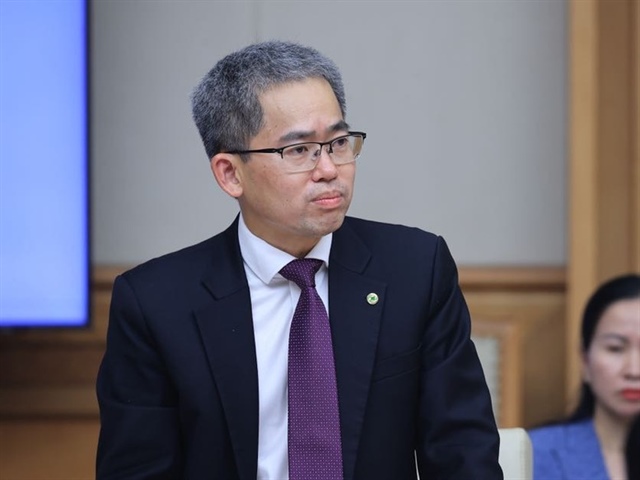
Chairman of Asia Commercial Joint Stock Bank (ACB) Tran Hung Huy speaks at the conference – Photo: VGP/Nhat Bac
|
At the conference of the Government Standing Committee working with joint-stock commercial banks on solutions to contribute to the socio-economic development of the country, on September 21, the leaders of the banks sent many proposals and recommendations to the Government leaders.
Promote and maximize the use of resources and assets for business expansion and development
To continue credit growth towards areas that contribute to economic development and promote personal consumption, according to Mr. Tran Hung Huy, Chairman of Asia Commercial Joint Stock Bank (ACB), in August 2024, the new Laws issued in 2024 have also brought about many important changes and positive impacts on the real estate market (such as the Land Law, Housing Law, and Real Estate Business Law).
However, credit institutions hope to have more detailed guidance in accepting mortgages, specifically related to production and business land (paying annual land rent) especially in industrial parks. According to the current regulation in Article 37 of the Land Law 2024, only the right to transfer is prescribed, and in the case of mortgages, only assets owned by the mortgagor that are attached to the land can be mortgaged, and there is no regulation on mortgaging the leasehold right in the land lease contract.
This affects and limits credit institutions in determining the value of annual land rent in industrial parks, depending on the cooperation of the investor due to legal risks in handling secured assets. Meanwhile, the market demand is very large. Industrial real estate has been maintaining its leading position throughout 2023 and continues to grow in the first half of 2024, thanks to policies promoting public investment and the great potential of FDI capital.
According to Mr. Tran Hung Huy, in case there is a clear direction allowing the mortgage of the asset right, which is the leasehold right in the land lease contract, it will help enterprises that lease land and pay annual land rent to maximize resources and the value of the land use right, create favorable conditions for enterprises in terms of capital when mortgaging additional assets are leasehold rights, and provide a full legal basis for credit institutions in determining the value and accepting the secured asset is land for annual rent.
Regarding production and business land (paying land rent once/land allocation with collection of land use levies), according to Point b Clause 3 Article 33 of the Land Law 2024, it is prescribed to allow the mortgage of investment projects with business purposes that are exempt/reduced from land use fees and land rent by the State. However, up to now, there has been no guidance on how to determine this amount of money.
“In fact, some projects that are entitled to incentives and exemptions from land use fees by the State have not yet had any documents guiding in detail the determination of the amount corresponding to the land use fee and land rent that has been exempted, the time for enterprises to pay to the State. Whether this amount is subject to late payment interest rates or other influencing factors or not? Because, obviously, the difference in time will lead to different numbers,” shared Mr. Tran Hung Huy.
According to Mr. Huy, currently, credit institutions and related agencies such as the Notary Office, the agency for registration of land use rights and secured transaction registration are confused in handling and directly affecting the interests of enterprises. Therefore, detailed guidance related to the above content is needed. From there, it will help expand and create opportunities for credit institutions and customers to have the right to mortgage in these cases.
“ACB hopes that the Government, ministries, and branches will soon issue Decrees and Circulars to guide the above issues. Accordingly, credit institutions and customers can promote and maximize the use of resources and assets to expand and develop their business. Banks in the system are united in controlling input mobilization costs, thereby serving as a basis for continuing to reduce lending interest rates,” said Mr. Tran Hung Huy, Chairman of ACB.
Promote credit growth rate
At the conference, a representative of Southeast Asia Commercial Joint Stock Bank (SeABank) proposed some solutions to promote the credit growth rate. Accordingly, capital demand from the economy must arise from the actual needs of enterprises’ production and business activities. Therefore, it is recommended that enterprises, industry associations, socio-political organizations, and local governments actively grasp the specific difficulties of enterprises to find solutions.
In addition, it is necessary to improve the efficiency of credit guarantees for small and medium-sized enterprises to help them access bank loans more easily without being constrained by borrowing conditions and collateral and have a mechanism to coordinate effectively between the parties involved, including the Small and Medium Enterprise Credit Guarantee Fund, commercial banks, associations, and local governments…
Ministries and branches need to effectively and proactively implement macroeconomic policies and synchronous solutions for industries, fields, regions, and localities of both the Central and local levels. Especially the synchronous implementation of solutions to promote trade, expand export markets, exploit domestic demand, improve the business environment, unblock the real estate market, and corporate bond market.
Enterprises also need to proactively restructure their production and business activities, accepting the elimination of inefficient business lines and choosing new directions to improve the internal quality of the enterprise, meeting the minimum conditions of banks in auditing and approving loans.
Strengthen the review, simplification of procedures and processes for credit granting, optimize the application of digital transformation in the credit granting process, and reduce costs to strive to reduce lending interest rates.
Have a mechanism to support banks in handling secured assets and debt recovery (mechanism, policy, legal corridor).
Especially, consider continuing to extend Circular 02/2023 on debt rescheduling and debt group maintenance, and add affected borrowers by Storm No. 3 to the subjects of support.

OCB’s leader said that the State Bank has performed its role well in proactively, flexibly, and effectively managing monetary policy – Photo: VGP/Nhat Bac |
A representative of Orient Commercial Joint Stock Bank (OCB) also said: “In the past eight months, the State Bank has performed its role well in proactively, flexibly, and effectively managing monetary policy. The close coordination between monetary policy and fiscal policy has supported economic growth while controlling inflation and ensuring macroeconomic stability. We expect the State Bank to continue to take supportive measures, especially reducing the OMO interest rate and the operating interest rate.”
According to OCB’s leader, the bank is facing many difficulties and challenges that need to be solved. These problems not only affect business efficiency but also hinder the sustainable development of the bank. Therefore, OCB would like to propose a specific recommendation for the State Bank and other ministries and branches to support and overcome.
First, it is proposed that the State Bank consider managing the credit limit (room credit) more flexibly, especially for well-evaluated banks. Credit limits should only be applied to banks that need to be tightly managed by the State Bank.
Second, the Government and the State Bank should create a mechanism for debt handling similar to Resolution 42, which facilitates banks in seizing and handling secured assets. In addition, we hope for a unified legal framework related to the transfer of secured assets, which are real estate, to banks, facilitating debt handling. Currently, this regulation is not implemented synchronously among localities, causing difficulties for banks in handling assets.
Third, remove the mechanism and policy obstacles, and the bottlenecks in investment procedures, which are currently very slow, especially for real estate projects. When these bottlenecks are cleared, the supply will be improved, helping the real estate market to warm up, creating a positive psychology for investment and consumption. For example, the issue of the land price frame has not been resolved, causing many enterprises to be unable to complete their land use right transfer tax obligations and not be able to be granted land use right certificates.















